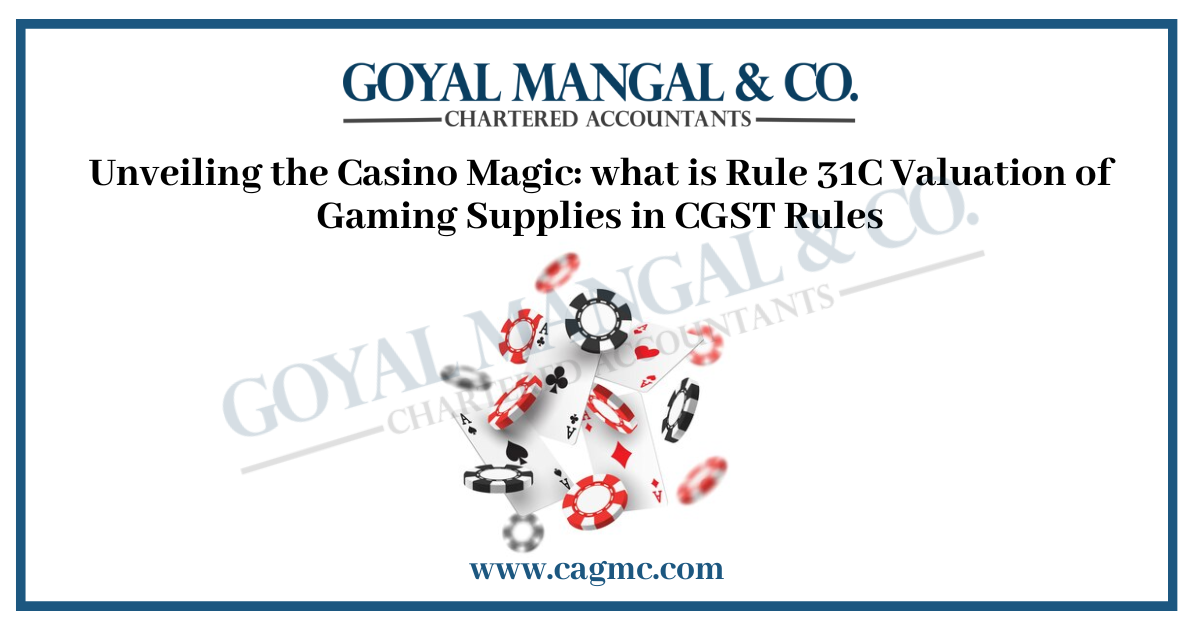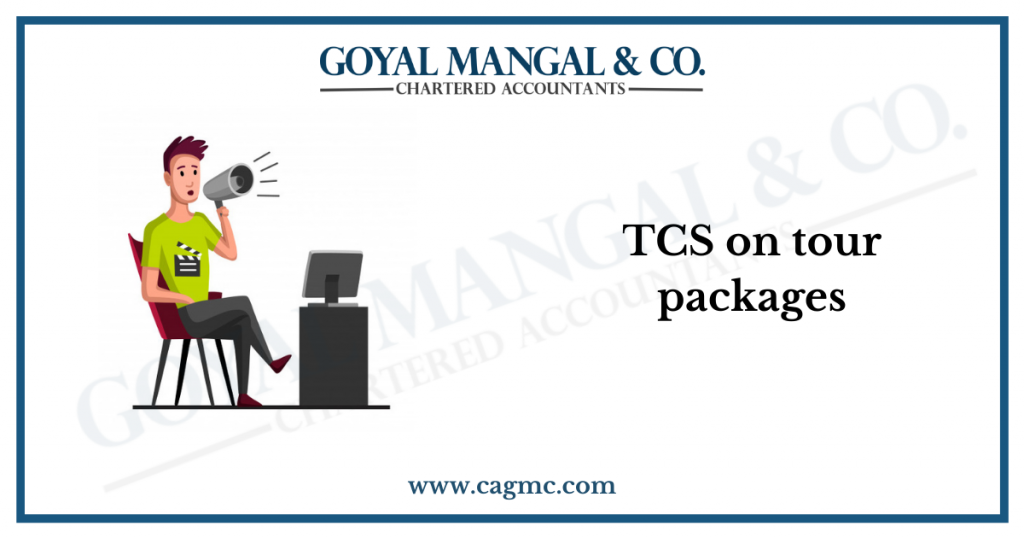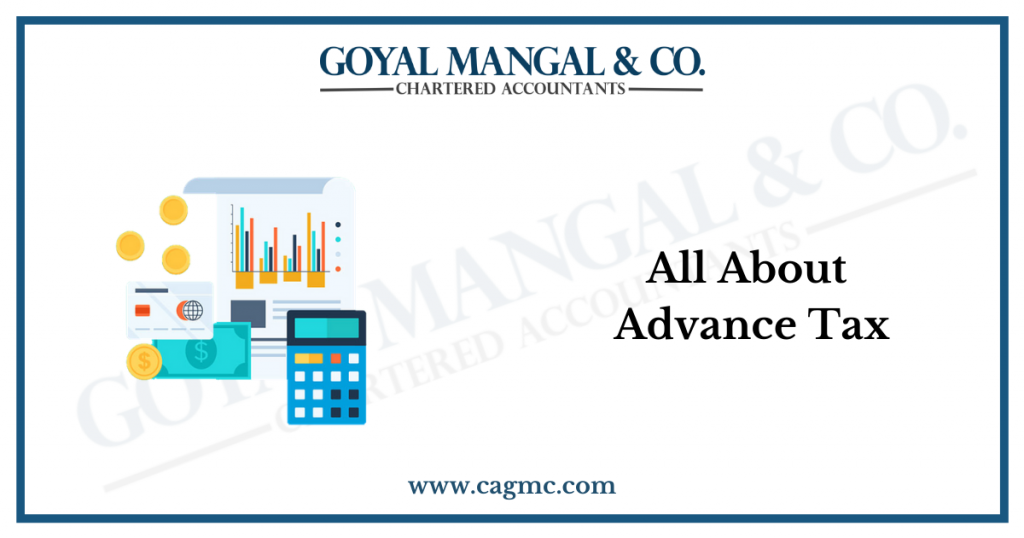
The introduction of the Goods and Services Tax (GST) in India brought about a significant change in tax legislation, particularly affecting the gaming and casino sector. Adhering to GST regulations is of great significance for casinos and online gaming platforms. The evaluation of the worth of gaming provisions is a crucial aspect of ensuring compliance. what is Rule 31C Valuation of Gaming Supplies as stipulated by Rule 31 C of the Central Goods and Services Tax (CGST) Rules. This blog explores the sophisticated process of assessing the worth of casino supply, revealing the inherent complications in this system. This article explores the complex process of evaluating the value of casino suppliers, emphasizing the many distinctions that arise within this context. This blog seeks to clarify the issues and considerations that are crucial for ensuring compliance and comprehension within the growing tax landscape of the gambling business, by examining the various nuances of GST legislation.
Table of Content: |
What is Rule 31C?
Notification No. 45/2023-Central Tax implemented Rule 31C in the CGST Act, 2017 on 06.09.2023, highlighting the application of GST on activities such as Betting, Gambling, Casinos, Horse Racing, Lottery, and Online Gaming. Rule 31C specifically focuses on the valuation of supplies with actionable claims in the context of Casinos, specifically addressing the complex taxation issues related to GST Law.
Casino Supply Value
The process of ascertaining the worth of casino materials under the Goods and Services Tax (GST) entails various crucial components specified in Rule 31C of the CGST Rules, 2017. In order to determine this value, specific principles are involved:
- Consideration Amount: The primary factor in assessing the worth of a casino supplier is the consideration amount. This figure represents the aggregate amount of money or its equivalent that is required to be paid to the casino or gaming service provider. It encompasses all expenses and costs associated with the gaming activity.
- Prize Money and Jackpots: The distribution of prize money and jackpots is unique to the casino sector. Rule 31C highlights the need of including the full value of casino services, including the face value of prize money or jackpot sums, regardless of whether they have been distributed to players or not.
- Commissions or Discounts: Casinos occasionally offer commissions or discounts related to gambling. If the casino or gaming service provider offers these reductions or commissions, they are included in the computation of the casino supply value.
- Taxes and Duties: An important consideration when estimating the value of casino goods is the amount of taxes and duties that must be paid to the government. The Goods and Services Tax (GST), along with other taxes, is regarded as an essential component of the value of the supply.
These variables combined form the basis for determining the value of casino services under GST, ensuring a thorough assessment that includes different financial aspects related to gaming activities.
Exceptions:
what is Rule 31C Valuation of Gaming Supplies exceptions for transactions in casinos:
- Exclusion from Refunds: Any refunds or returns that a casino makes to a player, regardless of the reason (such as winnings or other circumstances), do not reduce the value of claims that are brought inside the casino’s jurisdiction. Even if the player receives a partial return, their initial payments are still subject to taxes.
- Exemption for Unwithdrawn Earnings: The total amount paid to the provider does not include earnings that are set aside for future play and are not withdrawn. There is no taxation on these unclaimed earnings, hence there is no possibility of double taxation.
These exclusions outline circumstances that are essential for determining tax assessments in casinos, helping to prevent undue taxation. By guaranteeing that only the principal purchase and participation costs are taxed, they preserve openness; avoid confusion when determining taxable amounts, and preserve equity in casino transactions.
GST Charges for Gaming Services
The new suggestions by the GST Council indicate a significant change in the taxation of online games, namely in relation to Casino services. The Council suggests implementing a standardized Goods and Services Tax (GST) rate of 28% for all online games, including those that require skill, depending on the total revenue generated. This modifies the tax framework to include the entire value of the investment rather than just the fee charged by the platform.
For Casinos, a uniform tax rate of 28% is applied to the entire amount spent on chips upon entering. It is important to note that the Goods and Services Tax (GST) does not apply to bets that are made across multiple rounds, including those made using profits from a previous round. The purpose of this particular regulation is to simplify tax calculations for operators of casinos.
The adoption of a standardized 28% GST rate for online games is in line with the objective of streamlining tax processes and promoting consistency across various platforms. Moreover, the exemption of Goods and Services Tax (GST) on wagers that span numerous rounds aims to reduce complications for Casino operators, making their taxation procedures more efficient.
GST Law and Online Gaming:
Commencing on October 1, 2023, the jurisdiction of the GST Council has been extended to encompass Online Gaming, with the objective of rationalizing and unifying the tax procedures for online gaming platforms. According to this ruling, Online Gaming, which includes games that require skill as well as games that rely on chance, will be taxed at a fixed rate of 28% based on the total revenue generated by the platform.
Additional CBIC Notification
The Central Board of Indirect Taxes and Customs (CBIC) released Notification No. 51/2023-Central Tax on 29.09.2023, in accordance with Section 15(5). This announcement declares that the assessment of the provision of Online Gaming, Online Money Gaming, and actionable claims in Casinos shall be ascertained in a manner that has been officially communicated. The CBIC will establish explicit standards and methods for determining the taxable value of these supplies, thus assuring a uniform and consistent approach.
Eligibility of Input Tax Credit
Businesses that are officially registered in the Casino and Online Gaming industry are eligible to get Input Tax Credit (ITC) according to Section 16(1) of the CGST Act, 2017. This credit can be claimed for the goods and services that are used to support and enhance their operations. Nevertheless, there are restrictions outlined in Section 17(5) that prohibit the claiming of Input Tax Credit (ITC) for specific applications. This provision prohibits the inclusion of credits for activities that are outside the scope of the business, personal use, supplies that are exempt from GST, or goods/services that are not subject to GST, such as alcohol for human consumption or petroleum products. Furthermore, it is not possible to claim an Input Tax Credit (ITC) for supplies that are facilitated through e-commerce providers that are required to collect tax under Section 52. In order for Casino and Online Gaming operators to be eligible for Input Tax Credit (ITC), it is crucial to ensure that the products and services they claim connect directly with their company activities and do not fall into the forbidden categories specified in Section 17(5) of the Act.
Conclusion
what is Rule 31C Valuation of Gaming Supplies : The implementation of GST under Rule 31C of the CGST Act, 2017 represents a significant change in the taxation of Casino and Online Gaming services. This regulation implements a standardized 28% Goods and Services Tax (GST) rate, simplifying the process of tax evaluation for both operators and players. It is essential to grasp the intricacies of calculating taxable value, determining GST rates, and establishing eligibility for Input Tax Credits within this framework. The notification issued by the Central Board of Indirect Taxes and Customs (CBIC) under Section 15(5) enhances clarity by establishing standardized valuation procedures. This action not only rationalizes the process of calculating taxes but also promotes a more transparent structure within the industry. Embracing these changes, it promotes an informed discussion on taxation and regulation in the Casino and Online Gaming sectors, which in turn supports future improvements and constructive conversation. We appreciate and encourage your important ideas and comments to contribute to the ongoing development of taxation and regulation.


